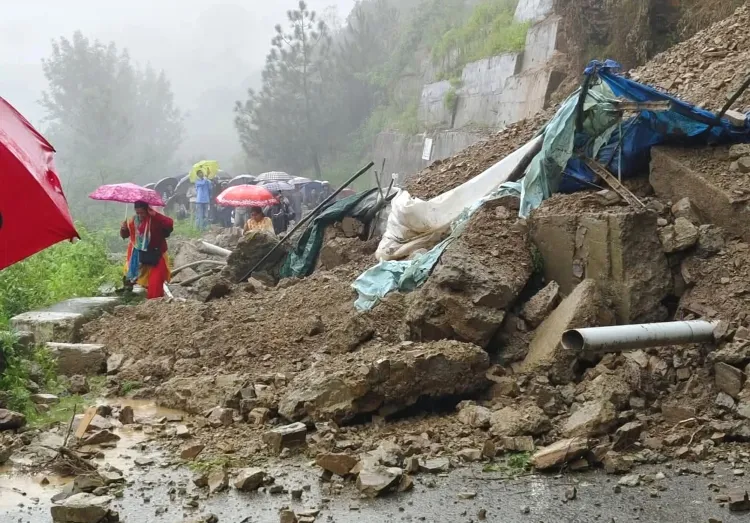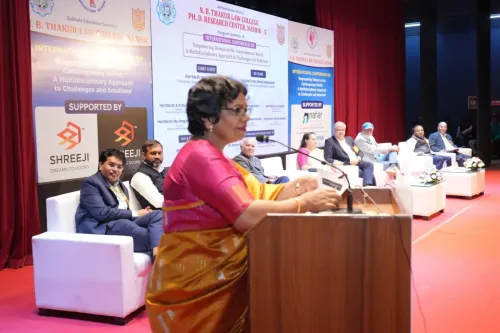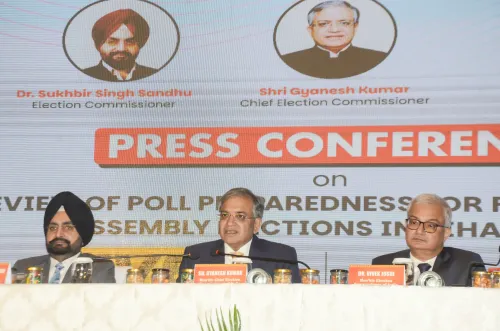Could HP Disappear from the Map? SC Warns Centre and State

Synopsis
Key Takeaways
- The Supreme Court emphasizes the importance of ecological preservation.
- The warning of HP vanishing underscores the urgency of environmental action.
- Revenue generation should not compromise environmental integrity.
- Current ecological practices need immediate re-evaluation.
- The call for a detailed action plan from the state government reflects accountability.
New Delhi, Aug 1 (NationPress) The Supreme Court has conveyed to the Centre and the Himachal Pradesh government that "earning revenue is not everything", cautioning that if the ongoing pattern of ecological deterioration persists, "the entire State of HP may vanish into thin air from the map of the country".
Expressing concern that "God forbid this doesn’t happen", a bench consisting of Justices J.B. Pardiwala and R. Mahadevan stated that generating revenue should not come at the expense of environmental and ecological integrity.
The Justice Pardiwala-led Bench dismissed a private hotel company’s petition that contested the Himachal Pradesh government’s notification designating Shri Tara Mata Hill as a "green area", while also reprimanding both the state and Union governments for their failure to safeguard the delicate Himalayan ecosystem.
The petitioner – M/s Pristine Hotels and Resorts Pvt. Ltd. – contested a notification dated June 6, 2025, which limited new private construction on Tara Mata Hill, arguing that the restrictions were imposed contrary to the Himachal Pradesh Town and Country Planning Act, 1977.
After the Himachal Pradesh High Court rejected the petition, stating that the company could not be classified as an aggrieved party since it lacked land ownership or permission to acquire land in the state, Pristine Hotels and Resorts escalated the issue to the Supreme Court.
However, the apex court declined to intervene.
"We are not inclined to interfere with the impugned judgment and order passed by the High Court," the apex court remarked, while emphasizing the numerous environmental challenges confronting Himachal Pradesh.
The court noted that while the initiative to declare green areas was "laudable", it had been implemented too late.
"The situation in Himachal Pradesh has deteriorated significantly. The severe ecological imbalance and other environmental issues have resulted in serious natural disasters over the years," stated the Justice Pardiwala-led Bench, citing recurrent floods, landslides, and extensive loss of life and property.
"It is incorrect to solely hold nature accountable for the disasters in Himachal Pradesh. Humans, not nature, are the cause of issues like ongoing landslides, collapsing buildings, and road subsidence," the Supreme Court remarked.
The apex court attributed the environmental decline to hydro power projects, unregulated road construction, deforestation, and unchecked tourism.
"Relentless construction of buildings, tunnels, and roads, often carried out without adequate environmental planning, has heightened the area's vulnerability to natural disasters and the impacts of climate change," it stated.
Moreover, the apex court expressed concern over uncontrolled tourism, inadequate solid waste management, illegal mining, and rapid infrastructure development.
"The uncontrolled expansion of tourism has put pressure on the state's environment. Hill towns frequently face waste disposal issues and water shortages during tourist seasons. If left unchecked, tourism's impact could severely disrupt the ecological and social fabric of the State."
In the interest of the public, the Supreme Court instructed its registry to initiate a fresh suo motu writ petition to oversee environmental conditions in Himachal Pradesh.
"We urge the state of Himachal Pradesh to respond to our observations, particularly regarding the issues discussed in this order," it said, requesting the state government to present a detailed action plan within four weeks.
Setting the next hearing date for August 25, the apex court issued notices to the Chief Secretary of Himachal Pradesh and the Secretary of the Union Ministry of Environment, Forest, and Climate Change.









